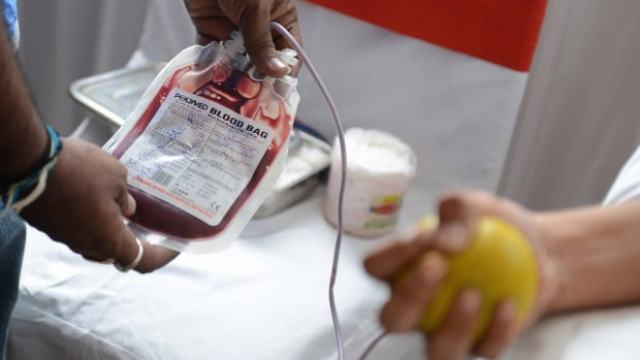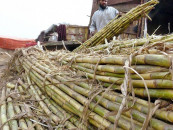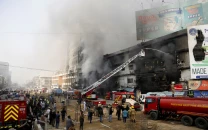Spike in HIV/AIDS cases: Over two dozen blood banks sealed
Several dialysis patients reportedly infected at Chandka hospital

According to Chachar, the scope of the investigation will be widened once the reports of the suspected patients are revealed. PHOTO: AFP
According to informed officials, a man, whose name is not being disclosed to protect his privacy, tested positive for HIV/Aids after getting a dialysis at CMCH. Officials revealed that out of 204 patients getting a dialysis every day at the facility, 54 have tested positive for HIV/Aids.
However, Sindh Aids Control Program manager Dr Muhammad Younis Chachar said blood samples of 26 HIV-suspected patients have been sent to Karachi for analysis. "Their results will be established in a few days," he said.
Terming it 'grave negligence' on part of the hospital, Chachar said around 52 patients were affected with HIV on October 3 due to the infected dialysis machine at CMCH. He confirmed that 15 blood banks in Kamber, five in Shahdadkot and five in Larkana have been sealed.

After media reports were aired, officials from the National Aids Program, Sindh Aids Control Program and Sindh Blood Transfusion Cell reached CMCH to ascertain the facts.
A nurse, who works at CMCH's dialysis centre, said on the condition of anonymity that the hospital screens patients getting a dialysis for Hepatitis B and C, while no one checks them for HIV/Aids.
According to her, out of 204 regular visitors, only 13 patients were found HIV/Aids positive while 34 were Hepatitis B and C positive. However, she said that after every dialysis, the machine is automatically cleaned by a disinfectant and therefore the question of getting infected from it does not arise.
Negating the 'hyped' media reports, CMCH, Larkana medical superintendent Dr Jawed Shaikh told The Express Tribune that after every dialysis, the machine takes around 35-40 minutes for cleaning. He said the disinfectant cleans all the germs and the machines cannot be put into operation if it is not cleaned properly.
However, Dr Iqbal Siddiqui, a medical expert based in Sukkur, claimed that there are always 50% chances of infection through a dialysis machine. He explained that before putting a patient on the dialysis, he or she is screened for Hepatitis B and C and if the patient is positive, they are placed on machines specifically meant for Hepatitis B or C patients.
He claimed that in large hospitals where a number of people go for dialysis, the chances of getting infected multiply. "The only way to stop infecting healthy people is to use separate machines for the positive and negative-tested persons," he added.
An official in Larkana claimed that there are 1,300 registered HIV/Aids patients in the district, who besides getting medicines, benefit from counselling services provided to them at CMCH. He added that the number of unregistered patients is around 10,000, who neither get medicine nor counselling.
According to Chachar, the scope of the investigation will be widened once the reports of the suspected patients are revealed. However, he believes that awareness about the disease has to be created among the masses, especially in Larkana which has a history of high prevalence of the virus.
Published in The Express Tribune, October 12th, 2016.



















COMMENTS
Comments are moderated and generally will be posted if they are on-topic and not abusive.
For more information, please see our Comments FAQ